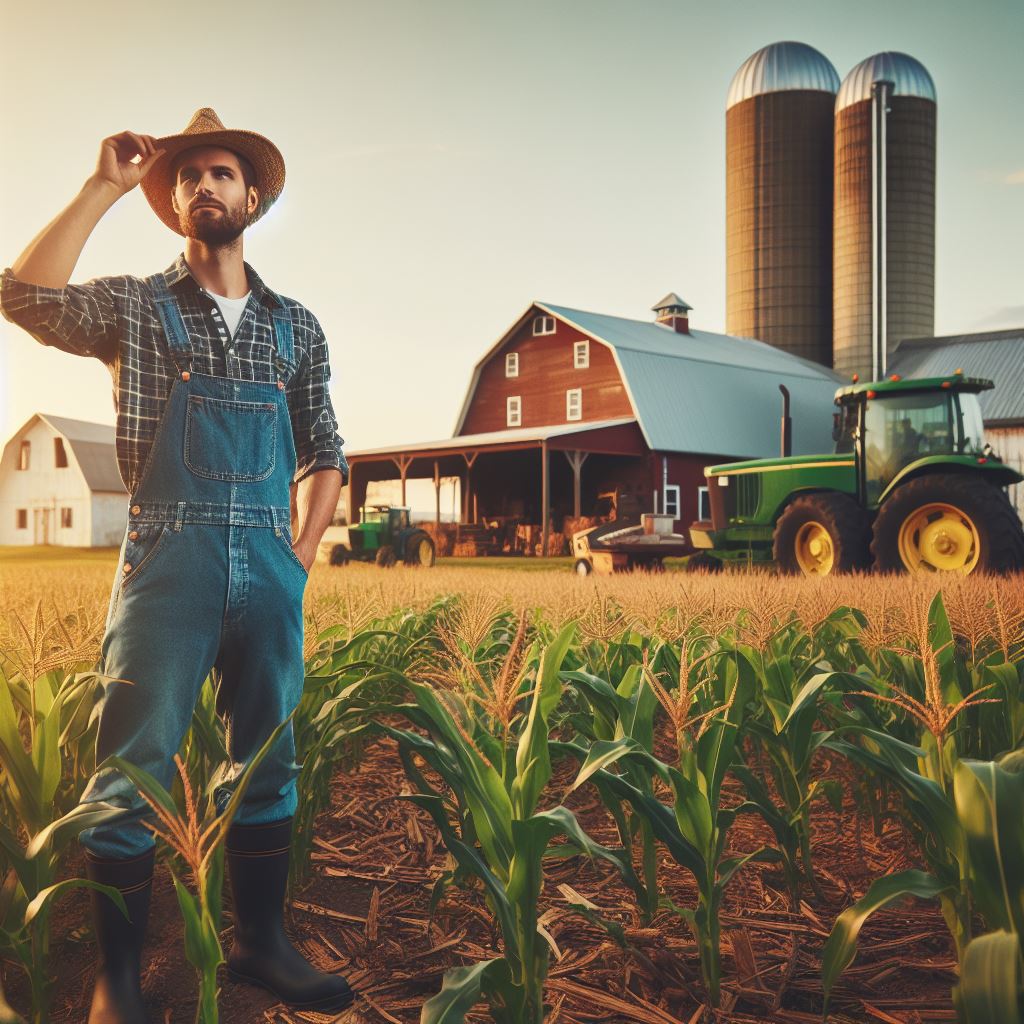Introduction
Farm safety measures are an essential aspect of ensuring the well-being of farmers and workers.
Importance of farm safety measures
Safety should be a top priority on every farm, as agriculture is one of the most hazardous industries.
Investing in farm safety measures is crucial to protect lives, prevent injuries, and maintain a productive and sustainable farming operation.
Farm accidents can have severe consequences, including physical injuries, disabilities, and even fatalities.
With the use of heavy machinery, pesticides, and working with livestock, farms present numerous risks.
However, these risks can be significantly minimized by adopting appropriate safety measures and investing in the necessary equipment and training.
Need for investment in farm safety
Investing in farm safety measures is not only a moral responsibility but also a wise business decision.
Accidents can lead to financial burdens, such as medical costs, legal liabilities, and loss of productivity.
By implementing safety protocols and providing proper safety equipment, farms can mitigate these risks and protect their workers and assets.
Furthermore, investing in farm safety measures demonstrates a commitment to sustainability and responsible farming practices.
It enhances the reputation of the farm and instills confidence in consumers who are increasingly concerned about the origins and production practices of their food.
Prioritizing safety also contributes to employee satisfaction and retention, as workers feel valued and protected.
In general, the importance of farm safety measures cannot be overstated.
Investments in safety equipment, training, and protocols are crucial for the well-being of farmers and workers, the financial stability of the farm, and meeting consumer expectations.
It is time to recognize the significance of farm safety and allocate resources accordingly for a safer and more sustainable agricultural industry.
Transform Your Agribusiness
Unlock your farm's potential with expert advice tailored to your needs. Get actionable steps that drive real results.
Get StartedCurrent status of farm safety
Statistics on farm accidents and fatalities
Every year, thousands of farm accidents occur, resulting in serious injuries and even deaths.
According to the National Institute for Occupational Safety and Health (NIOSH), agriculture has one of the highest fatality rates of any industry.
Tractor overturns, machinery entanglements, and exposure to harmful chemicals are common causes of accidents.
Lack of awareness and protection measures
Unfortunately, many farmers are unaware of the potential dangers and lack proper safety training.
Due to the nature of their work, farmers are often exposed to various hazards without adequate protective measures.
Insufficient financial resources and limited access to safety equipment also contribute to the lack of protection.
Importance of a proactive approach
- Investing in farm safety measures is crucial for ensuring the well-being of farmers and reducing accidents.
- Proactive safety measures can prevent injuries and fatalities, resulting in fewer medical expenses and lost workdays.
- Prioritizing farm safety also improves the overall efficiency and productivity of agricultural operations.
To address the current status of farm safety, it is essential to raise awareness and implement proactive measures to protect farmers.
- Educating farmers about the potential dangers and promoting safety training programs can significantly reduce accidents.
- Providing financial assistance and support to farmers for purchasing protective equipment and implementing safety protocols is crucial.
- Collaborating with government agencies, agricultural organizations, and industry stakeholders can help create standardized safety guidelines.
- It is vital to involve farmers in the decision-making process to ensure that the implemented measures are practical and effective.
- Regular safety inspections and audits should be conducted to identify potential hazards and ensure compliance with safety regulations.
- Encouraging the use of technology, such as sensors and automation, can enhance safety by alerting farmers to potential dangers.
- Sharing success stories and case studies of farms that have successfully implemented safety measures can inspire others to prioritize farm safety.
Investing in farm safety measures is a long-term commitment that benefits not only the farmers but also their families and the entire agricultural industry.
- By reducing accidents and fatalities, farmers can have greater peace of mind while working, knowing that they are protected.
- Families of farmers can be relieved from the financial burden of medical expenses and loss of income caused by accidents.
- The agricultural industry as a whole can improve its reputation and attract more individuals to pursue careers in farming.
In essence, the current status of farm safety highlights the need for immediate action to protect the well-being of farmers.
By raising awareness, providing support, and implementing proactive measures, we can create a safer environment for farmers and ensure the sustainability of agriculture.
Investing in farm safety is an investment in the future of farming.
Benefits of investing in farm safety measures
Investing in farm safety measures comes with a range of benefits that can positively impact the overall operation of the farm.
By implementing these measures, farms can significantly reduce accidents, injuries, and even fatalities.
Reduction in accidents, injuries, and fatalities
Farmers understand that their most valuable assets are their workers and investing in safety measures can protect them.
When accidents are prevented through safety measures, the number of injuries and fatalities decreases.
This not only safeguards the workers but also saves the farm from the potential loss of skilled labor.
Improved productivity and efficiency
Moreover, investing in farm safety measures leads to improved productivity and efficiency.
By ensuring a safe work environment, workers will be able to focus more on their tasks, resulting in increased productivity.
Safety measures such as proper training and the use of protective equipment can reduce the chances of accidents and downtime due to injuries.
Compliance with regulations and legal requirements
Furthermore, compliance with regulations and legal requirements is essential in the farming industry.
Investing in farm safety measures ensures that the farm operates within the legal framework and meets the necessary standards.
This helps to avoid penalties and legal disputes that could negatively impact the farm’s finances and reputation.
Positive impact on reputation and employee morale
Notably, investing in farm safety measures has a positive impact on the reputation of the farm.
Showcase Your Farming Business
Publish your professional farming services profile on our blog for a one-time fee of $200 and reach a dedicated audience of farmers and agribusiness owners.
Publish Your ProfileWith increasing concerns about worker safety and social responsibility, customers and stakeholders are becoming more conscious of how farms operate.
Farms that prioritize safety measures not only build a positive reputation but also attract customers who value ethical farming practices.
In addition, investing in farm safety measures is vital for maintaining employee morale.
When workers feel safe and supported, they are more likely to be satisfied with their jobs.
This can lead to increased loyalty, commitment, and motivation among the farm’s workforce.
A positive work environment fosters teamwork and cooperation, contributing to overall productivity.
Beyond the immediate benefits, investing in farm safety measures can also result in long-term cost savings.
Prevention is always better than dealing with the aftermath of accidents or injuries, both in terms of financial and human costs.
By investing upfront in safety measures, farms can avoid expensive medical bills, lost workdays, and potential legal battles.
Furthermore, insurance premiums can be reduced by demonstrating a commitment to farm safety.
Insurers often provide discounted rates to farms with effective safety programs in place.
This can result in significant financial savings in the long run, while ensuring that the farm remains protected from unforeseen incidents.
In summary, investing in farm safety measures brings numerous benefits.
It reduces accidents, injuries, and fatalities, leading to a safer work environment.
Improved productivity, compliance with regulations, positive reputation, and enhanced employee morale are further advantages.
Moreover, it saves costs in the long run and results in potential insurance premium reductions.
Prioritizing farm safety is not only a responsible decision but also a wise investment for the overall success of the farm.
Key farm safety measures to consider
In order to ensure the safety of workers on farms, there are several key measures to consider. These measures include:
- Use of personal protective equipment (PPE): Providing workers with the necessary PPE, such as helmets, gloves, and safety goggles, can help prevent injuries.
- Implementing safety training programs: Conducting regular safety training programs can educate workers on potential hazards and teach them proper safety protocols.
- Regular maintenance and inspection of equipment: Keeping farm equipment properly maintained and regularly inspected can prevent accidents caused by equipment failures.
- Adequate signage and hazard identification: Clearly labeling hazardous areas and providing visible signage can help workers identify and avoid potential risks.
- Safe storage and handling of chemicals: Storing chemicals in appropriate containers and ensuring proper handling procedures minimizes the risk of spills and exposure.
- Emergency response and evacuation plans: Developing and practicing emergency response and evacuation plans can help ensure a quick and organized response in case of accidents or natural disasters.
By implementing these farm safety measures, farmers can create a safer work environment for their employees and reduce the risk of accidents and injuries.
Providing personal protective equipment, such as helmets and goggles, is essential to protect workers from potential hazards.
Safety training programs are also crucial in educating workers about the risks involved and teaching them how to mitigate these risks.
Regular maintenance and inspection of equipment is necessary to identify and address any potential issues before they lead to accidents.
Adequate signage and hazard identification are important in ensuring that workers are aware of potential dangers and can avoid them.
This can include labeling hazardous areas and clearly marking exits and emergency routes.
Furthermore, safe storage and handling of chemicals are essential to protect workers from harmful exposure.
Proper containers and handling procedures should be implemented to prevent spills and accidents.
In addition, farms should have emergency response and evacuation plans in place to ensure a prompt and coordinated response in case of accidents or natural disasters.
While implementing these safety measures requires planning and investment, the cost of neglecting farm safety can be much higher.
Accidents and injuries can result in medical expenses, loss of productivity, and damage to the farm’s reputation.
Moreover, ensuring the safety and well-being of workers is a moral obligation that cannot be overlooked.
Overall, investing in farm safety measures is essential for the well-being of workers and the success of the farm.
Key measures such as providing personal protective equipment, conducting safety training programs, maintaining equipment, using proper signage, and safe handling of chemicals can significantly reduce the risk of accidents and injuries.
By prioritizing farm safety, farmers can create a secure work environment and protect their most valuable asset – their workers.
Read: Precision Agriculture for Supply Chain Gains
Cost considerations
Investing in farm safety measures may require an initial investment in safety equipment and infrastructure.
However, the long-term benefits and cost savings make it a worthwhile endeavor.
Initial investment in safety equipment and infrastructure
Acquiring the necessary safety equipment and infrastructure may seem costly at first.
However, this initial investment is crucial for ensuring the well-being of farmers and workers.
Investing in safety equipment such as helmets, goggles, gloves, and safety harnesses can prevent accidents and injuries.
Implementing necessary infrastructure such as safety barriers, signage, and warning systems are also integral to farm safety.
Showcase Your Farming Business
Publish your professional farming services profile on our blog for a one-time fee of $200 and reach a dedicated audience of farmers and agribusiness owners.
Publish Your ProfileWhile the upfront costs may be significant, they are essential for mitigating potential hazards on the farm.
Long-term benefits and cost savings
Investing in farm safety measures can result in substantial long-term benefits and cost savings.
By reducing the number and severity of accidents, farms can decrease the associated medical and legal expenses.
Preventing injuries not only safeguards workers’ health but also minimizes lost productivity and time off due to accidents.
Farm safety measures contribute to better overall business efficiency and profitability.
Moreover, having a good safety record can improve a farm’s reputation and attract more customers or tenants.
Collaboration with insurance providers
Farmers can collaborate with insurance providers to offset some of the costs associated with safety measures.
Insurance companies often offer financial incentives or discounts to entities that prioritize safety.
Through a comprehensive safety plan, farms can demonstrate their commitment to risk management.
Insurance providers may provide risk assessments, guidance, and recommendations to enhance safety measures.
Collaboration with insurance providers can help farmers access safety training programs and resources.
Ultimately, while investing in farm safety measures might require an initial financial commitment, the long-term benefits and cost savings outweigh the expenses.
Acquiring the necessary safety equipment and infrastructure is crucial for safeguarding the well-being of farmers and workers.
Moreover, such investments contribute to enhanced business efficiency, reputation, and profitability.
Collaborating with insurance providers further assists in offsetting expenses and accessing valuable support.
By prioritizing farm safety, farmers ensure the sustainability and success of their operations in the long run.
Read: Precision Agriculture: Enhancing Farm Yields
Case studies and success stories
Investing in farm safety measures is crucial for the well-being of farm workers and the success of agricultural operations.
By examining case studies and success stories, we can explore real-life experiences, outcomes, lessons learned, and best practices.
Examples of Farms that Invested in Safety Measures
- Smith Family Farm implemented a comprehensive safety program, resulting in a 50% reduction in work-related injuries.
- Green Acres Dairy installed safety guards on all machinery, leading to a significant decrease in equipment accidents.
- Johnson Orchards provided proper training and protective gear for its employees, resulting in a sharp decline in chemical-related incidents.
- Black Horse Ranch implemented a strict vehicle maintenance plan, leading to a substantial reduction in transportation-related accidents.
Real-life Experiences and Outcomes
These case studies offer valuable insights into the outcomes of investing in farm safety measures:
- After implementing safety protocols, Smith Family Farm saw increased employee morale and productivity.
- Green Acres Dairy noticed a decrease in insurance premiums due to their improved safety record.
- Johnson Orchards experienced a decline in worker compensation claims, saving the farm significant financial resources.
- Black Horse Ranch saw an increase in customer trust and loyalty, resulting in higher sales and profitability.
Lessons Learned and Best Practices
From these success stories, several lessons can be learned, and best practices can be implemented:
- Invest in ongoing safety training for all employees to ensure they are aware of potential hazards and how to mitigate risks.
- Create a culture of safety by involving workers in decision-making processes and encouraging their active participation in safety initiatives.
- Regularly assess and update safety protocols to adapt to changing technologies and industry standards.
- Provide proper safety equipment and ensure its proper use and maintenance through regular inspections.
- Encourage open communication about safety concerns and near-miss incidents to address potential hazards proactively.
- Regularly review and evaluate the effectiveness of safety measures to identify areas for improvement.
- Invest in proper signage and markings to clearly communicate safety procedures and hazards.
- Ensure supervisors and managers are trained in safety protocols and lead by example in practicing safe behaviors.
By following these best practices and learning from the successes of others, farms can significantly reduce the risk of accidents, protect the well-being of their workers, and enhance their overall operational efficiency.
Investing in farm safety measures is not only a moral duty but also a wise business decision.
By prioritizing safety, farms can create a positive work environment, reduce financial losses, and improve their reputation within the industry.
In the next section, we will explore the role of government regulations in encouraging farms to invest in safety measures and ensuring compliance with industry standards.
Read: Managing Livestock Risks Effectively

Resources and support available
When it comes to investing in farm safety measures, there are various resources and support available to farmers, ensuring their agricultural operations are safer and more secure.
These include:
Government initiatives and funding programs
The government recognizes the importance of farm safety and has established initiatives and funding programs to support farmers in implementing safety measures.
These programs provide financial assistance for the purchase of safety equipment and the implementation of safety protocols.
Agricultural safety organizations and associations
There are several agricultural safety organizations and associations that aim to promote and improve farm safety.
These organizations provide guidance, training, and resources to farmers on various safety-related topics, including machinery operation, chemical handling, and livestock safety.
Online tools and resources for farm safety
In this digital age, online tools and resources have become invaluable in promoting farm safety.
These tools include safety checklists, hazard identification guides, and safety training modules, all easily accessible and user-friendly.
Farmers can access these resources anytime, anywhere, allowing them to stay up-to-date with the latest safety practices.
By taking advantage of these available resources and support, farmers can effectively invest in and improve farm safety measures, benefiting both themselves and their agricultural operations.
Read: Eco-Agribusiness: Balancing Costs
Conclusion
Recap of the importance of investing in farm safety measures
Investing in farm safety measures is crucial for the well-being of farmers and the agricultural industry as a whole.
By prioritizing safety, farmers can protect themselves from potential accidents and injuries.
This leads to increased productivity and profitability.
Showcase Your Farming Business
Publish your professional farming services profile on our blog for a one-time fee of $200 and reach a dedicated audience of farmers and agribusiness owners.
Publish Your ProfileFurthermore, investing in farm safety measures demonstrates a commitment to the well-being of workers and the environment.
It creates a positive image for the industry, attracting skilled workers and consumers who prioritize sustainable and responsible practices.
Encouragement for farmers to take action
Farmers are encouraged to take action and invest in safety measures such as proper training, protective equipment, and regular maintenance of machinery.
These steps ensure a safe working environment and minimize the risks associated with operating in a hazardous setting.
While there might be initial costs involved in implementing safety measures, the long-term benefits outweigh the expenses.
By preventing accidents and injuries, farmers can avoid costly medical bills, lawsuits, and loss of productivity.
Moreover, insurance premiums may decrease, leading to substantial savings in the long run.
Potential for long-term sustainability and success
Investing in farm safety measures also contributes to the long-term sustainability and success of the farming operation.
By minimizing accidents and injuries, farmers can maintain a stable workforce and reduce turnover.
This leads to increased efficiency and profitability, as experienced workers can contribute more effectively to the operation.
In closing, investing in farm safety measures is not only ethically responsible but also financially advantageous.
By prioritizing safety, farmers can protect themselves, their workers, and their business, ensuring success and sustainability in the long run.
It is a wise investment that reaps both immediate and long-term benefits for the entire agricultural industry.




